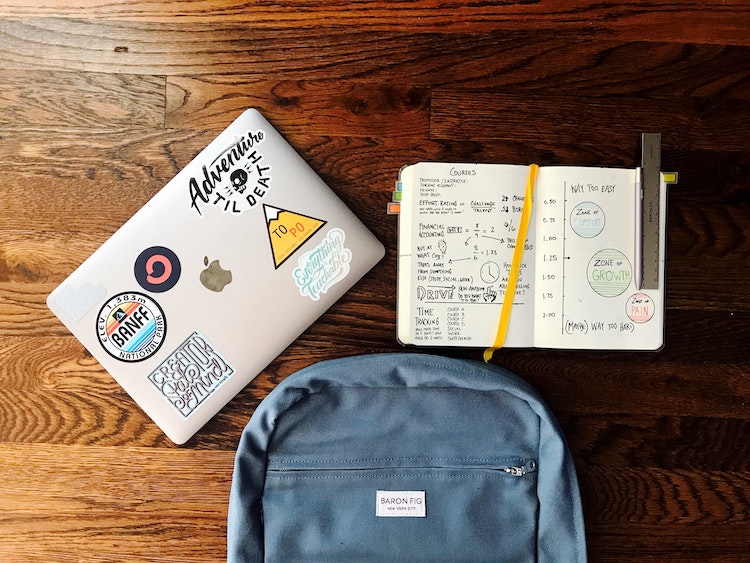
When is the best time to start revising for GCSEs? And what should your revision timetable look like?
As long-term readers will know, Flea is now 15 and would have been taking her GCSEs at the end of this academic year, had Covid not got in the way.
You’d think given that GCSEs are cancelled, no revision. But alas (for my teen) this isn’t the case. Flea’s school is sitting a second full set of mock exams at the end of April, and there is talk of examination boards setting modular papers or exercises that students must complete in school. These will then be marked in school and used to determine final grades.
Flea’s school finished early for summer at the end of year 10, in mid-June. They also went back early at the start of Year 11, in mid-August. So Flea sat her first set of GCSE mocks a little earlier, in November. Some schools sat exams in December or January.
With this in mind, I thought it might be helpful to share some updates throughout this year of when Flea decided to start her GCSE revision, what techniques and resources she’s using, and tips we’re picking up along the way.
When to Start Revising for GCSEs
One of the difficult things for kids currently studying for GCSEs is that nobody really knows when the 2021 “tests” will happen (or even if they will happen). They might be early, or late, or shorter – and who knows what they’re even going to look like.
On that basis, we’ve advised Flea to assume that there is always a chance that her mock exam grades might form the basis of teacher assessed grades in the future. And for that reason, the best time to start revising for GCSEs is at the start of Year 11.
First Steps in Flea’s Revision Planning
Flea actually started revising for GCSEs in a really informal way during July and August. She started by creating a big chart showing all the topics she would need to revise for each of her subjects. She stuck them to the wall in my office (which has been turned into her study) where they could be easily seen.
Our revision plan (which I reserve the right to amend as we go) showing when to start revising for GCSEs looks a bit like this:
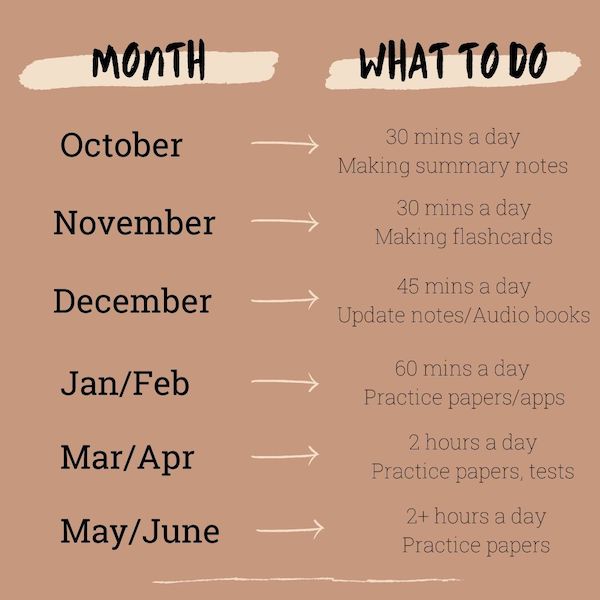
In August and September, Flea has spent about 30 minutes a day making summary notes of each topic. We bought an A4 spiral book for each subject, and Flea used those books to write a page or two of notes on every topic on her list.
My hope is that making these notes will help Flea to spot if there are any gaps in her books, due to absences or issues at school.
Revision Resources at GCSE
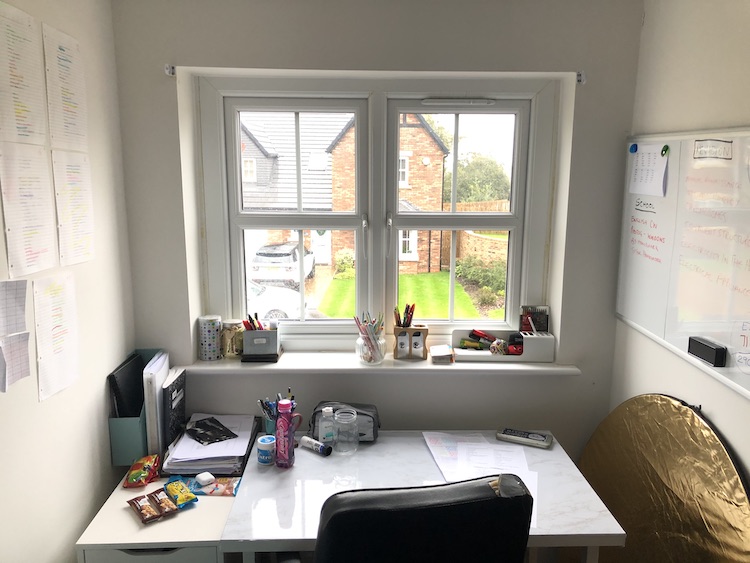
To start with, we bought Flea a couple of packs of these spiral bound A4 notebooks for her summary notes. I also got a bunch of these spiral record card booklets. She can use them for flashcards without worrying about cards slipping out and getting lost. And they’re only £1.99 each, which I thought was good value.
For maths revision, we’re currently using a combination of apps, depending on the subject. Flea is working her way through the Exemplar GCSE revision plan, and using the apps from BBC Bitesize and Seneca to practice maths techniques.
According to Exemplar there are around 290 lessons to cover for GCSE maths, and Flea has currently covered around 75 of them. I think that’s decent enough progress for now. I don’t want to overload Flea at this stage and have her get bored and disinterested by Christmas.
At the moment, for English we’re just focusing on familiarity with the relevant texts. To help Flea, I bought a couple of audio books: this one for Romeo and Juliet, and this for An Inspector Calls. We have a long road trip at half-term so I also got these audio book version of her history textbook to listen to while we drive.
We’ve also bought revision books from CGP for each subject – hopefully these will be good for Flea to test herself later, and plug any gaps in her exercise and text books.
What’s Going Well
Flea definitely bought into the idea of “revise little, revise early” and this means hopefully she has familiarised herself with topics that she hadn’t otherwise looked for in a year, or more.
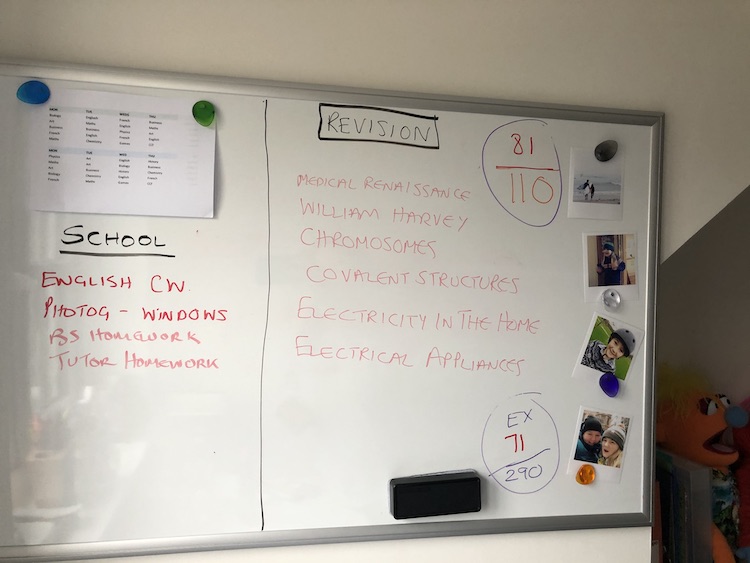
Of the 110 topics Flea identified in the summer, she has now made notes on 90 topics, which I think puts her in a great position to start “proper” revision in the coming weeks (this photo was taken last week).
Flea is working in my office and has taken over my white board. Having a white board means *I* can see what Flea is completing, and what’s due. Plus, it’s a great visual reminder to Flea. I think having the numbers showing how many maths modules and how many topics she’s made notes for is also key to motivation.
So far this term, Flea has had a couple of tests this month in biology and english and did pretty well on those, which I’ve found reassuring.
What’s Going Less Well
When we thought about the best time to start revising for GCSEs, it was the summer holidays. It was no big deal for Flea to find a spare 30 minutes in a day to make notes. Now she has tennis lessons and hockey coaching and personal training, it’s a lot harder. And that’s before you factor homework in!
When it comes to revising maths, Flea has been slower to make progress than on her other topics. Although she’s covered 71 maths topics, she’s tended to start with the things she’s found easiest, so there’s a lot of work still to go. But there’s plenty of time, and I am proud that Flea’s done some work on a quarter of the topics, when we’re still only a couple of months into the year.
I’m trying to encourage Flea by saying that:
- Today (whenever that is) is 100% the best time to start GCSE revision. Little and often over six or seven months is going to be a million times easier than cramming and stress over two months.
- She needs to be in a decent position for mocks because you never know. Those exams might be the basis for teacher-assigned grades if we’re still in a Covid hole next summer.
- You also need to work harder because who knows when a year, or a teacher, or a whole school needs to be isolated. It’s not fair and it’s tough, but she needs to plan for the worst, and hope for the best.
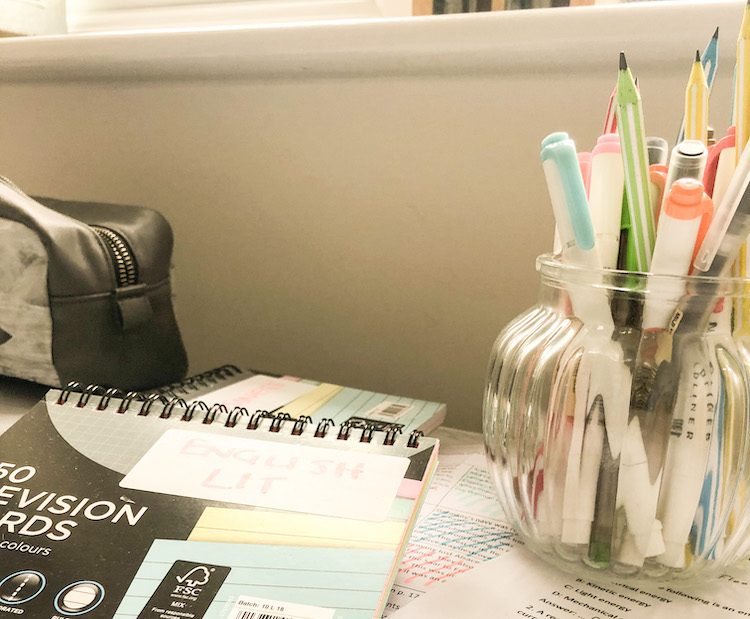
Top Tips for Starting GCSE Revision
Obviously it’s very early days in our house but I am relieved that Flea has started doing some very light revision already. The current GCSE cohort are in a weird position, but as I keep telling Flea, it sucks and it isn’t fair, but you have to hope for the best and plan for the worst.
- The best time to start revising for GCSEs is at the start of Year 11 or just right now, because this year’s GCSE students really need to be on their A game in time for mocks.
- If your teens are just starting to think about revision, my recommendation is just do something. 30 minutes a day makes all the difference. If you’ve got 15 minutes a day to listen to an audio study guide, do that. Spend 2 hours watching a performance of Romeo & Juliet. Ask your child to complete 1 page of notes a day. Just do something every day towards what feels like a massive task.
- To start, your teen should focus on ensuring their notes are complete, all worksheets are glued in, diagrams labelled and so on. You can’t revise from incomplete work.
- Download the exam board specification. This should give you a clear idea of what content is covered, and how marks are allocated. Flea has found this really useful in understanding how to squeeze the most marks possible from each question.
- Talk to your child’s teachers. Ask if there are any concepts or topics that your child is struggling with. Are there areas of the syllabus that might pull down their grade? For example, Flea can work at a level 9 in English but her teacher advised her to put more work into her transactional writing assignments, as that was pulling her down to an 8.
- Before you buy lots of revision guides online, ask if they’re available through school. Flea’s school sells a range of CGP revision guides at £2 less than they cost on the high street. Every little helps!
- Don’t go in too hard and heavy. 30 minutes a day before Christmas is more than enough and will put you ahead of most kids in your year. Your motto should be “little and often”.
- Some people will say if you revise too early you’ll forget. But personally, I think revising early means you’re more relaxed, which actually helps you to retain that information more effectively when you do more concentrated revision later.
- When starting GCSE revision, try and make a high level list of topics by subject. Look at textbooks and revision books to identify things you might have missed in your notes.
- My recommendation is to view revision as like a house. You need a strong foundation of good notes to make good summary notes. Those summary notes form the basis of your flashcards. Your flashcards are what you memorise. You need to memorise in order to start testing yourself. Those tests enable you to practice recall. Don’t be tempted to skip steps. They’re all important.





Great advice Sally.
My oldest missed her GCSE’s last year, and got predicted grades. A’s abs A*’s which is fantastic. But it’s just a hard world to be in for children at the moment. The advice and tips you’ve given will definitely help people.